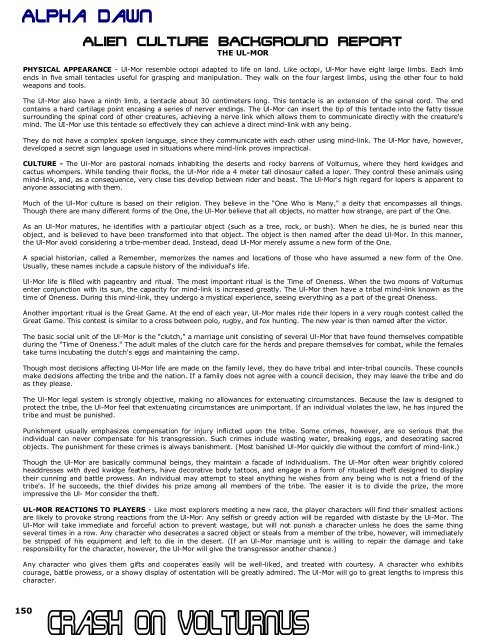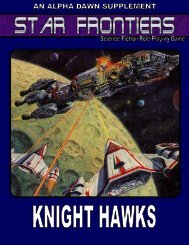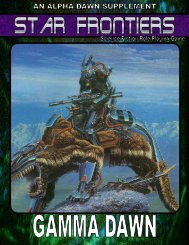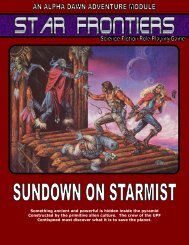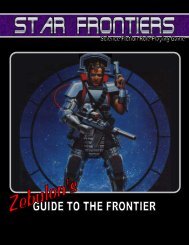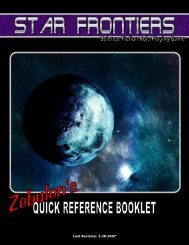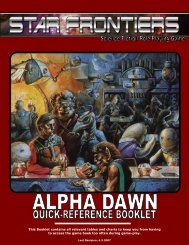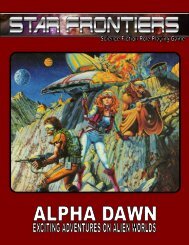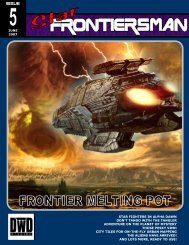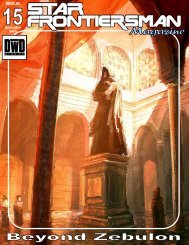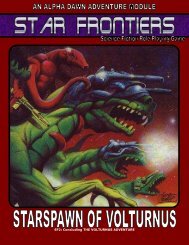Alpha Dawn - Star Frontiersman
Alpha Dawn - Star Frontiersman
Alpha Dawn - Star Frontiersman
You also want an ePaper? Increase the reach of your titles
YUMPU automatically turns print PDFs into web optimized ePapers that Google loves.
150<br />
ALIEN CULTURE BACKGROUND REPORT<br />
THE UL-MOR<br />
PHYSICAL APPEARANCE - Ul-Mor resemble octopi adapted to life on land. Like octopi, Ul-Mor have eight large limbs. Each limb<br />
ends in five small tentacles useful for grasping and manipulation. They walk on the four largest limbs, using the other four to hold<br />
weapons and tools.<br />
The Ul-Mor also have a ninth limb, a tentacle about 30 centimeters long. This tentacle is an extension of the spinal cord. The end<br />
contains a hard cartilage point encasing a series of nerver endings. The Ul-Mor can insert the tip of this tentacle into the fatty tissue<br />
surrounding the spinal cord of other creatures, achieving a nerve link which allows them to communicate directly with the creature's<br />
mind. The UI-Mor use this tentacle so effectively they can achieve a direct mind-link with any being.<br />
They do not have a complex spoken language, since they communicate with each other using mind-link. The Ul-Mor have, however,<br />
developed a secret sign language used in situations where mind-link proves impractical.<br />
CULTURE - The Ul-Mor are pastoral nomads inhabiting the deserts and rocky barrens of Volturnus, where they herd kwidges and<br />
cactus whompers. While tending their flocks, the Ul-Mor ride a 4 meter tall dinosaur called a loper. They control these animals using<br />
mind-link, and, as a consequence, very close ties develop between rider and beast. The Ul-Mor's high regard for lopers is apparent to<br />
anyone associating with them.<br />
Much of the Ul-Mor culture is based on their religion. They believe in the "One Who is Many," a deity that encompasses all things.<br />
Though there are many different forms of the One, the Ul-Mor believe that all objects, no matter how strange, are part of the One.<br />
As an Ul-Mor matures, he identifies with a particular object (such as a tree, rock, or bush). When he dies, he is buried near this<br />
object, and is believed to have been transformed into that object. The object is then named after the dead Ul-Mor. In this manner,<br />
the Ul-Mor avoid considering a tribe-member dead. Instead, dead Ul-Mor merely assume a new form of the One.<br />
A special historian, called a Remember, memorizes the names and locations of those who have assumed a new form of the One.<br />
Usually, these names include a capsule history of the individual's life.<br />
Ul-Mor life is filled with pageantry and ritual. The most important ritual is the Time of Oneness. When the two moons of Volturnus<br />
enter conjunction with its sun, the capacity for mind-link is increased greatly. The Ul-Mor then have a tribal mind-link known as the<br />
time of Oneness. During this mind-link, they undergo a mystical experience, seeing everything as a part of the great Oneness.<br />
Another important ritual is the Great Game. At the end of each year, Ul-Mor males ride their lopers in a very rough contest called the<br />
Great Game. This contest is similar to a cross between polo, rugby, and fox hunting. The new year is then named after the victor.<br />
The basic social unit of the Ul-Mor is the "clutch," a marriage unit consisting of several Ul-Mor that have found themselves compatible<br />
during the "Time of Oneness." The adult males of the clutch care for the herds and prepare themselves for combat, while the females<br />
take turns incubating the clutch's eggs and maintaining the camp.<br />
Though most decisions affecting Ul-Mor life are made on the family level, they do have tribal and inter-tribal councils. These councils<br />
make decisions affecting the tribe and the nation. If a family does not agree with a council decision, they may leave the tribe and do<br />
as they please.<br />
The Ul-Mor legal system is strongly objective, making no allowances for extenuating circumstances. Because the law is designed to<br />
protect the tribe, the Ul-Mor feel that extenuating circumstances are unimportant. If an individual violates the law, he has injured the<br />
tribe and must be punished.<br />
Punishment usually emphasizes compensation for injury inflicted upon the tribe. Some crimes, however, are so serious that the<br />
individual can never compensate for his transgression. Such crimes include wasting water, breaking eggs, and desecrating sacred<br />
objects. The punishment for these crimes is always banishment. (Most banished Ul-Mor quickly die without the comfort of mind-link.)<br />
Though the Ul-Mor are basically communal beings, they maintain a facade of individualism. The Ul-Mor often wear brightly colored<br />
headdresses with dyed kwidge feathers, have decorative body tattoos, and engage in a form of ritualized theft designed to display<br />
their cunning and battle prowess. An individual may attempt to steal anything he wishes from any being who is not a friend of the<br />
tribe's. If he succeeds, the thief divides his prize among all members of the tribe. The easier it is to divide the prize, the more<br />
impressive the Ul- Mor consider the theft.<br />
UL-MOR REACTIONS TO PLAYERS - Like most explorers meeting a new race, the player characters will find their smallest actions<br />
are likely to provoke strong reactions from the Ul-Mor. Any selfish or greedy action will be regarded with distaste by the Ul-Mor. The<br />
Ul-Mor will take immediate and forceful action to prevent wastage, but will not punish a character unless he does the same thing<br />
several times in a row. Any character who desecrates a sacred object or steals from a member of the tribe, however, will immediately<br />
be stripped of his equipment and left to die in the desert. (If an Ul-Mor marriage unit is willing to repair the damage and take<br />
responsibility for the character, however, the Ul-Mor will give the transgressor another chance.)<br />
Any character who gives them gifts and cooperates easily will be well-liked, and treated with courtesy. A character who exhibits<br />
courage, battle prowess, or a showy display of ostentation will be greatly admired. The Ul-Mor will go to great lengths to impress this<br />
character.


